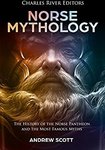Taken from website:
*Includes pictures
*Includes medieval accounts of Norse mythology
*Includes online resources and a bibliography for further reading
*Includes a table of contentsMuch of what is known of the Norse myths comes from the 10th century onwards. Until this time and, indeed, for centuries afterwards, Norse culture (particularly that of Iceland, where the myths were eventually transcribed) was an oral culture. In fact, in all Scandinavian countries well into the 13th century laws were > memorized by officials known as “Lawspeakers” who recited them at the “Thing.” The Thing was the legislative assembly in Scandinavia “held for judicial purposes.”
One of the most famous of these Lawspeakers was the Icelander Snorri Sturluson, a masterful writer who wrote the Prose Edda in the thirteenth century. There are other sources for the Norse myths, namely the later “Poetic Edda,” a collection of poems and prose work, and other sagas but the Snorri’s Prose Edda is the most complete work whose attribution is known to modern scholars.
The Prose Edda is a collection of Norse Myths split into three sections, the Gylfaginning (the Deluding of Gylfi), the Skáldskaparmál (the Language of Poetry) and the Háttatal (the Enumeration of Meters). The first has a frame story that entails a Swedish King, Gylfi, disguising himself as an old man, Gangleri, when he journeys to Asgard to meet the gods. When he arrives, he meets three men - “High One, Just-As-High, and Third” - who reveal to him stories of the world and the gods. The second section contains a warning for Christians not to believe in the Norse gods, specifically the two families, the Æsir and the Vanir, but also refutes the notion that they were demons, which was a common supposition among some Christians at the time. The Prose Edda begins in this line of thought with a euhemeristic prologue, which traces the history of the Norse Gods as human heroes of Troy, making Thor one of King Priam’s sons.
The Norse Myths also appear to follow a chronological narrative, which the historian John Lindow describes as having a “Mythical Past, Present and Future,” and it is believed that Snorri, a Christian, recorded these pagan beliefs to preserve and explain the stylistic poetry of Iceland, particularly the popular descriptive devices known as kennings. A kenning is made up of a base word and a modifying word that is used to describe a separate object. For example, “Gold” had a great many kennings, one of which was “Sif’s Hair.” If, however, the memory of Loki cutting off Sif’s hair and replacing it with gold were lost, then this kenning would make no sense to later readers. There are many of these allusions to the myths, and it is thanks to them that the myths have survived.
Thanks to recent Hollywood depictions of the Norse gods, they are more popular than ever before. For example, despite the virtual disappearance of the indigenous Norse religion and mythology several centuries ago, modern society still regularly encounters the storm god Thor, who continues to be brought back to life in the form of literature and has recently been the protagonist in several blockbuster movies. At the same time, the scarcity of literature about them leaves room for plenty of debate. Modern scholars have to base their theories of Norse gods and the cult practices that are associated with them on fragmentary and untrustworthy sources, but, despite this, for many of the gods there is enough specific information to form a nearly full picture of their character and functions.
Norse Mythology: The History of the Norse Pantheon and the Most Famous Myths looks at the origins of the legendary deities and the stories about them. Along with pictures depicting important people, places, and events, you will learn about Norse mythology like never before.





cool story bro.
Thanks for posting!